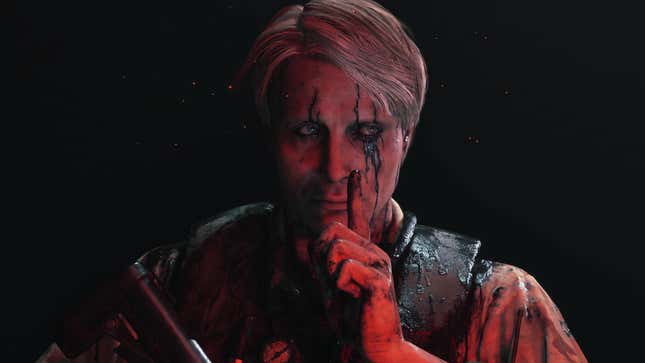
Whatever you think about Hideo Kojima’s latest fever dream—which imagines a world exactly like our own, except that Norman Reedus can’t walk good—you likely figured it was going to be divisive. Initial reviews lent credence to that idea; some critics adored Death Stranding despite its sharp corners and long, uneventful stretches. Others thought Kojima sacrificed fun in favor of nonsensical high-concept wankery. Over the weekend, Kojima voiced his own opinion about those reviews. Trouble is, nobody’s entirely sure what he meant.
The saga of Kojima’s comments on American Death Stranding reviews is nearly as labyrinthine as the saga of Death Stranding itself. It began with an interview with Italian site Tgcom24 over the weekend. English-speaking site Wccftech then wrote a piece based on the Italian transcription—though not the original Japanese recording—of Kojima’s quote. In it, the site posited that he had said Death Stranding wasn’t able to strand its way into U.S. audiences’ hearts because it’s not a first-person shooter. Instead, Wccftech said Kojima said, it’s something better.
“I must say that the game received rave reviews, especially in Europe and Japan,” said Kojima, according to Wccftech’s translation. “Here in the United States, however, we have had stronger criticisms. Perhaps it is a difficult game to understand for a certain type of critic and audience. Americans are great fans of first-person shooters and Death Stranding isn’t one, it flies higher.”
He went on to compare American audiences to those of other countries, saying (again according to Wccftech) that he always aims to create new things that garner discussion, but “Italians or the French have a different artistic sensibility that allows them to appreciate this kind of very original product, not only in video games but also in cinema.”
That “flies higher” bit, especially, is quite an audacious statement. Death Stranding is ambitious, sure, but more so than every entry in a genre that’s sprouted countless branches over the course of decades? Naturally, this created quite a fuss among fans—some of whom wound up disputing Wccftech’s translation. Major sites like IGN proceeded to weigh in with translations that put a different slant on Kojima’s assessment, removing his declaration that Death Stranding “flies higher.” Instead, according to IGN, Kojima merely stated that “Americans are some of the biggest first-person shooter fans, and Death Stranding isn’t that.” In other words, it’s unfamiliar—not necessarily better or worse.
Then Sony itself got in on the action, re-translating that last line as “in America there are a lot of FPS fans, maybe those fans are saying this is like a different game and are not rating it very high.” So more or less the same meaning as IGN’s, albeit with additional flavor and context. It’s unclear whether they accessed Kojima’s original Japanese or not.
Kotaku’s Natalie Degraffinried, who speaks Italian, also took a crack at translating the quote. Here’s what she came up with:
“I have to say that the game has received enthusiastic reviews, especially in Europe and Japan. Here in the United States, however, we’ve received stronger criticisms. Maybe it’s a difficult game to understand for a certain type of critic and the public. In America, there are many fans of first-person shooters, and a lot of them [wish] that Death Stranding [were] a different game; maybe for that [reason], they didn’t give higher scores.”
“I always look to create new things and [welcome] controversy and discussion, but it must be said that the Italians and the French have a diverse sensibility that allows them to appreciate this more original genre of product, [not only] in video games but also in film.”
No matter how you slice it, it seems Kojima made some pretty broad generalizations. Translation, however, is a tricky art, and it often leaves room for interpretation. This is an important thing to keep in mind not only when reading quotes from Kojima—who has found himself in situations like this before—but anybody who isn’t speaking the language their words will ultimately be printed in. We’ll provide an update if we can get our hands on the original Japanese quote.

